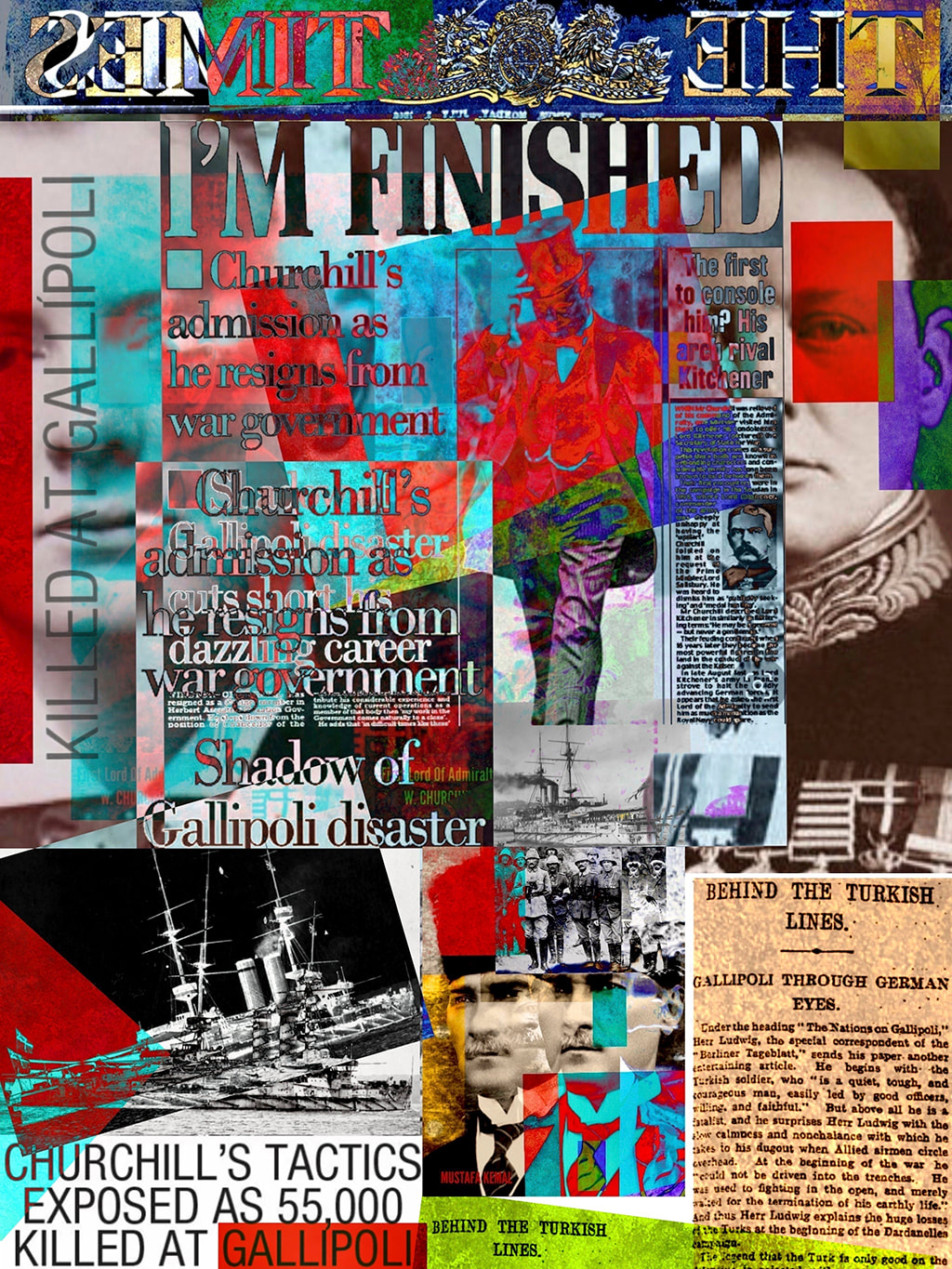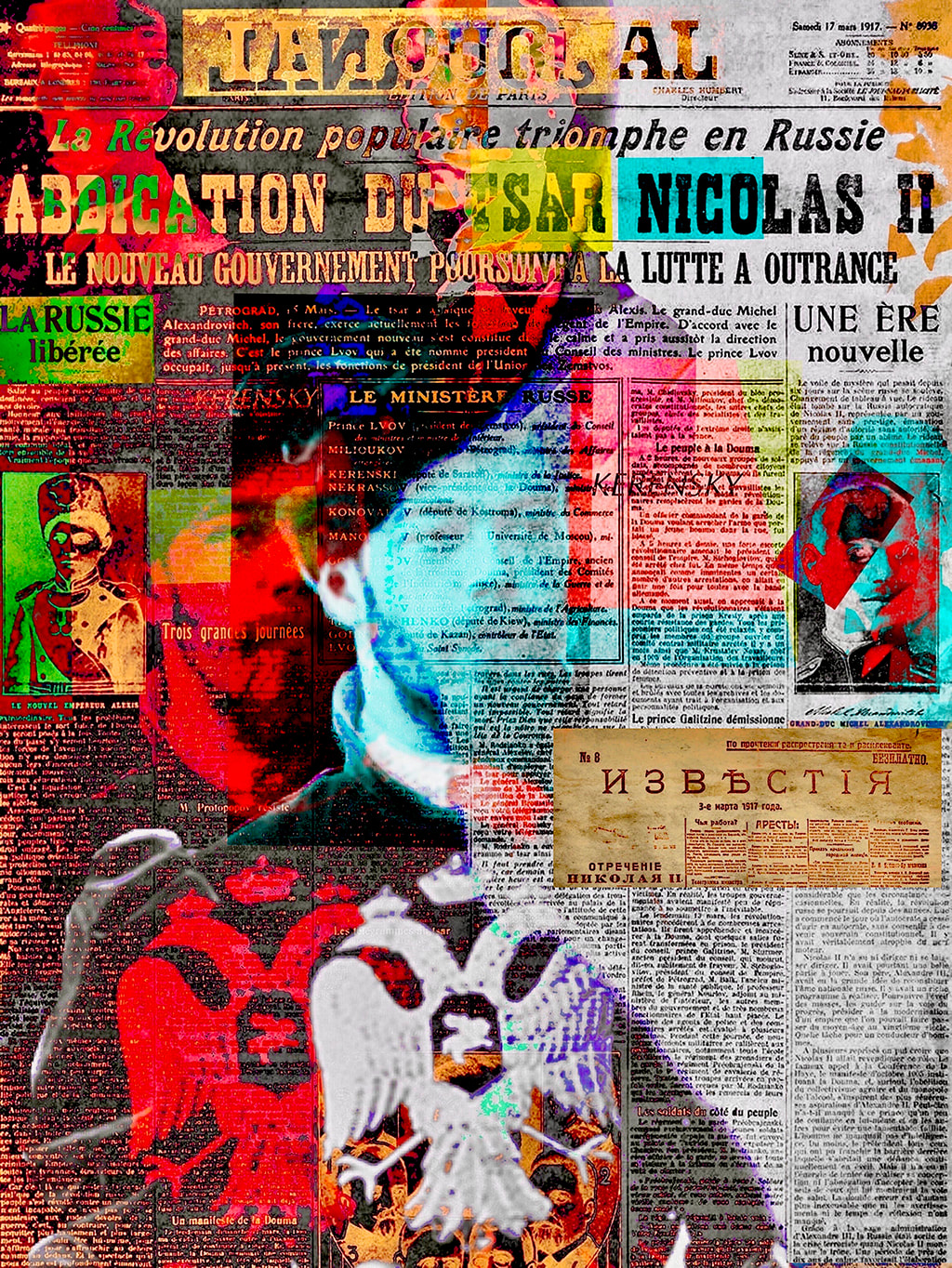| 1914_el_bisabuelo_en_biarritz.pdf | |
| File Size: | 717 kb |
| File Type: | |
Arriba descargar archivo del texto en español
1914 GREAT-GRANDDAD IN BIARRITZ
When I saw the picture, I felt that I had been locked up for too long without taking the car and losing myself in the horizon. I was not listening to the music with my ears but with the images. For months I had barely left the studio, working on a photographic series on my family album, revising, classifying and experimenting with old photos of my ancestors. And there they are, quiet, relaxed, enjoying a day at the beach. Biarritz, 1914, my great-granddad, elegant, with his canotier, leaning his left foot on the crossbar of the chair where my granddad sits, a 14-year-old future General of the Spanish Navy, dressed as a sailor with a “salacot” style hat, smiling. They are accompanied by another man of whom I know nothing. Summer begins. Biarritz is the image of the good life enjoyed by the prosperous bourgeoisie and European high society.
My great-granddad, Eduardo Viscasillas Blanque (Zaragoza 1848 / Madrid 1938), Spanish diplomat and composer, is a year since he was appointed Director of the Grand Municipal Orchestra of Biarritz. His life was spent between Biarritz, Paris, London, Rome, Barcelona, Bologna, Monte Carlo ......Honorary Academician of the Academy of Fine Arts in Bologna, Secretary of the Spanish Academy of Fine Arts in Rome, author of over 100 musical works he composed operas, waltzes, serenades, hymns, marches...In 1888 his musical composition "Notte in Venezia" received a prize from Giussepe Verdi in the International Music Exhibition of Bologna. In 1891, Eduardo and his son Manuel Viscasillas won the Medal of the Centenary of Mozart, on the anniversary of his death (1791-1891). The medal was imposed by the Mayor of Salzburg (Austria), for their interpretation of the K207Concerto for violin and orchestra at the Mozarteum. His compositions were performed by the major orchestras in the world, and were repertoire in Monaco and Biarritz (France). He was friend of Wagner's son-in-law, Franz Beidler, who signed for him several scores of the "Colossus of Bayreuth". Eduardo was also a friend of Mattia Battistini, Massenet, Fortuny, Nobel Prize Laureate Giosue Carducci and many other great artists of the time, as well as the royal family.
The aristocratic summer resort is in full season, sea bathing, concerts, golf club, polo, European royalty, casino, parties, dancing until dawn at the Hotel du Palais de Biarritz...... what later became known as the Belle Époque is about to end, a way of life for the upper classes of society for whom wars and economic instability are a thing of the past. Industrial progress achieved a level of prosperity, though not for everyone, such as had never been seen before. That year Woodrow Wilson became president of the United States, marking the beginning of what would become the American superpower with the opening of the Panama Canal and its subsequent intervention in the Great War. Humanist intellectuals set the
guidelines for government action, they were the conscience of society, artists experimented without paying attention to academies or norms, science, literature, music, photography, discoveries, the beginning of cinema ...... everything changed, everything advanced vertiginously, there seemed to be no limits, feminism emerged with force, the suffragette Mary Richardson attacked Velázquez's Venus in the Mirror ....... Virginia Woolf, Coco Chanel, Gertrude Stein..... everywhere there was euphoria, confidence and blind optimism in Europe's possibilities. The Times of London began the year proudly highlighting Britain's advances in education, science, its recent past, its present and its future as an empire in the hope of perpetuating, for another year, its continuance on the path of achievement.
Stefan Zweig, wrote in his memories "Never was Europe stronger, richer and more beautiful. In 1900-10 there was more freedom, carefree than in the previous hundred years".
But then came Sarajevo. One hot day in the summer of 1914 the Habsburg heir, Archduke Franz Ferdinand, visits the city with his pregnant wife, the Duchess of Hohenberg, Sofia Chotek. It is Serbia's national day, the anniversary of the humiliating defeat of the Serbs by the Turks at the Battle of Kosovo in 1839. What the archduke did not know is that on that distant day of defeat a Serbian soldier managed to reach the quarters where the sultan was resting and killed him. So that Sunday, 28 June 1914, did not seem to be the most opportune date for the visit. A sense of humiliation was palpable among the dreamers of Greater Serbia, who wanted to throw off Austria's yoke. The "Black Hand", a secret organisation set up in 1911, whose members included several hundred nationalist military officers and whose leader Dragutin Dimitrijevic "Apis" headed the Information Services, appeared on the scene. Everything goes wrong, recklessness, coincidences and blunders coincide, the mistake of the driver of the archdukes' car and the chance meeting with the student and Black Hand activist Gavrilo Princip, who leaves the fashionable Moritz Schiller grocery store with a bacon and cheese sandwich, thinking that the attack has already failed, and who sees with surprise the opportunity to eliminate the hated symbol of the oppression of his homeland, throws the sandwich down without hesitation and shoots .......... In just a few moments, a sandwich brings the fate of Europe to the brink of the abyss and tragedy.
The Archduke had decentralising and reformist ideas for the Austro-Hungarian Empire. Emil Haylofts, professor and encyclopaedist, says: "Gavrilo Princip's assassination triggered a horrific conflict on an unprecedented scale. And it did so in the name of a fanatical and voracious nationalism, directed against the personage who embodied the most certain hopes for reform in the obsolete Habsburg monarchy. Gavrilo is today a hero to Serb supremacists and has his name on a street in Sarajevo, but how is he different from other assassins and should it be tolerated that he should be honoured in this way? Princip did not fight to free his people from tyranny, but to prevent a conciliatory alternative from coming to fruition. The attack was absolutely "the worse the better", pure and simple ruthless fanaticism. And then came the ultimatum and the war, into which
everyone rushed joyfully and unconsciously, confident of a sudden victory, "The war as a joke" said the French. Without hardly realising it, Europeans were plunged into this atrocious contest, whipped up into hatred by propaganda and revanchism, plunged into unreason and trenches, plunged into filth and misery at the front and in the rear.”
Europe had not suffered a major war since Napoleon, so what happened to trigger such a horrific conflict between all the great powers? Much has been written about the causes throughout the 20th century, but no definitive conclusions have been reached. Nationalism, economic and financial interests, political crises, a change in the mentality of the leaders, of the generals of the armies and also of the population who were carried away by inflammatory speeches. Why did diplomacy fail?
I return to the picture of Biarritz. They have not moved from the beach, they are still there. There might be a nice sea breeze. Later they will go for a drink with friends. Maybe with some Spanish royalty. Alfonso XIII is a regular holidaymaker. My great-granddad was related to the royal family for his social, diplomatic and artistic activities, the premieres of his plays and concerts...... Perhaps they will comment on how well the king played yesterday in the polo match, or not, or they will talk about politics, or stories of lovers of who knows, anything can be while enjoying a magnificent summer day. And between drinks they will read the newspapers, Le Petit Parisien, Le Matin, well maybe not these, a bit radical and socialist, The Times of course, and the local press, where they report on the works on the seafront ......Biarritz was to become a place of refuge for many wealthy members of high society and exiles during the war when it was granted neutrality status. Celebrities such as Coco Chanel will inaugurate a new shop opposite the casino in 1915, strolling with her new lover the Grand Duke Dimitri Romanov, one of those who killed Rasputin, while the earth trembles a few kilometres away amidst shells and cannon fire.
Without being aware of it, I start another project from the family album series, another parallel story that emerges from Biarritz. That summer life is going to change tragically for millions of people, I look for the newspapers of that year, of those days of 1914, and I see the political reactions reflected on paper, the photos and the texts, words and more words, the Sarajevo bombing seems to matter to almost nobody, social life goes on, the happy world goes on, the French President Poincaré is at the Grand Prix, at the racecourse, the Berlin press publishes pictures of families picnicking in the parks, in Vienna the beer gardens are full, the bankers go home to the countryside, the Kaiser is on his yacht Meteor, Churchill thinks this summer will be exceptionally quiet, the old emperor with the white sideburns Franz Joseph is at his summer residence, the Kaiservilla, in the spa town of Bad Ischl on the banks of the Traun, where he enjoys his great hobbies, his mistress, the former actress Katharina Schratt, and deer, the British royal family is already at Balmoral, the cocottes and ladies-in-waiting stroll through the spas, and the bon vivants and ....... The past was a minor time, with its wars and famines, an unenlightened society, there was no longer room for barbarism, only for peace and security.
As Zweig wrote: "Today, when the great tempest has long since passed, we know for certain that that world of security was a house of cards".
The press, thanks to technological advances, reaches thousands of readers quickly. The telephone transmits news published in national and local newspapers within a few hours. In 1910, Paris had 70 newspapers. The press was not only informing but also creating public opinion, culture and consumer advertising. But when the declarations of war began a few days later, in August 1914, everything changed in the press as well. As the first battles raged and the death toll rose, the press was to be censored, manipulated and controlled by the governments in an extreme nationalist rivalry. The veracity of the headlines was twisted by aggressive patriotic campaigns extolling their own exploits and ridiculing the enemy. Attempts were made to stamp out defeatism and pacifist voices as well as any information that would increase the social unrest already in conflict in 1917 with the rise of strikes and street riots.
Erich Maria Remarque in his famous work "All Quiet on the Western Front" reflects with crudeness the change from an initial romantic and heroic vision of the war to the gloomy reality of the trenches, ending with a denunciation of the lies of nationalism as the culprit of all the disasters.
From here I begin to work with the front pages of various newspapers, constructing new images that reflect the passage of the battles and events that are published, composing from multiple photographic exposures, superimposing and manipulating texts, from Sarajevo to the declarations of war, the Kaiser and his cousins, the Russian and British Tsars, the delirious and unconscious enthusiasm of the people shouting "Long live the war! "the minefields, the barbed wire, Gallipoli and Churchill's failure, Mustafa Kemal, the gas masks, generals of the different armies, the abdication of Tsar Nicholas II, Kerensky, Lenin, the Lusitania..... a work in progress, a long work that has just begun and I don't quite know when or where it will end.
Perhaps on the beach in Biarritz. They have not moved, they are still there.
1914 GREAT-GRANDDAD IN BIARRITZ
When I saw the picture, I felt that I had been locked up for too long without taking the car and losing myself in the horizon. I was not listening to the music with my ears but with the images. For months I had barely left the studio, working on a photographic series on my family album, revising, classifying and experimenting with old photos of my ancestors. And there they are, quiet, relaxed, enjoying a day at the beach. Biarritz, 1914, my great-granddad, elegant, with his canotier, leaning his left foot on the crossbar of the chair where my granddad sits, a 14-year-old future General of the Spanish Navy, dressed as a sailor with a “salacot” style hat, smiling. They are accompanied by another man of whom I know nothing. Summer begins. Biarritz is the image of the good life enjoyed by the prosperous bourgeoisie and European high society.
My great-granddad, Eduardo Viscasillas Blanque (Zaragoza 1848 / Madrid 1938), Spanish diplomat and composer, is a year since he was appointed Director of the Grand Municipal Orchestra of Biarritz. His life was spent between Biarritz, Paris, London, Rome, Barcelona, Bologna, Monte Carlo ......Honorary Academician of the Academy of Fine Arts in Bologna, Secretary of the Spanish Academy of Fine Arts in Rome, author of over 100 musical works he composed operas, waltzes, serenades, hymns, marches...In 1888 his musical composition "Notte in Venezia" received a prize from Giussepe Verdi in the International Music Exhibition of Bologna. In 1891, Eduardo and his son Manuel Viscasillas won the Medal of the Centenary of Mozart, on the anniversary of his death (1791-1891). The medal was imposed by the Mayor of Salzburg (Austria), for their interpretation of the K207Concerto for violin and orchestra at the Mozarteum. His compositions were performed by the major orchestras in the world, and were repertoire in Monaco and Biarritz (France). He was friend of Wagner's son-in-law, Franz Beidler, who signed for him several scores of the "Colossus of Bayreuth". Eduardo was also a friend of Mattia Battistini, Massenet, Fortuny, Nobel Prize Laureate Giosue Carducci and many other great artists of the time, as well as the royal family.
The aristocratic summer resort is in full season, sea bathing, concerts, golf club, polo, European royalty, casino, parties, dancing until dawn at the Hotel du Palais de Biarritz...... what later became known as the Belle Époque is about to end, a way of life for the upper classes of society for whom wars and economic instability are a thing of the past. Industrial progress achieved a level of prosperity, though not for everyone, such as had never been seen before. That year Woodrow Wilson became president of the United States, marking the beginning of what would become the American superpower with the opening of the Panama Canal and its subsequent intervention in the Great War. Humanist intellectuals set the
guidelines for government action, they were the conscience of society, artists experimented without paying attention to academies or norms, science, literature, music, photography, discoveries, the beginning of cinema ...... everything changed, everything advanced vertiginously, there seemed to be no limits, feminism emerged with force, the suffragette Mary Richardson attacked Velázquez's Venus in the Mirror ....... Virginia Woolf, Coco Chanel, Gertrude Stein..... everywhere there was euphoria, confidence and blind optimism in Europe's possibilities. The Times of London began the year proudly highlighting Britain's advances in education, science, its recent past, its present and its future as an empire in the hope of perpetuating, for another year, its continuance on the path of achievement.
Stefan Zweig, wrote in his memories "Never was Europe stronger, richer and more beautiful. In 1900-10 there was more freedom, carefree than in the previous hundred years".
But then came Sarajevo. One hot day in the summer of 1914 the Habsburg heir, Archduke Franz Ferdinand, visits the city with his pregnant wife, the Duchess of Hohenberg, Sofia Chotek. It is Serbia's national day, the anniversary of the humiliating defeat of the Serbs by the Turks at the Battle of Kosovo in 1839. What the archduke did not know is that on that distant day of defeat a Serbian soldier managed to reach the quarters where the sultan was resting and killed him. So that Sunday, 28 June 1914, did not seem to be the most opportune date for the visit. A sense of humiliation was palpable among the dreamers of Greater Serbia, who wanted to throw off Austria's yoke. The "Black Hand", a secret organisation set up in 1911, whose members included several hundred nationalist military officers and whose leader Dragutin Dimitrijevic "Apis" headed the Information Services, appeared on the scene. Everything goes wrong, recklessness, coincidences and blunders coincide, the mistake of the driver of the archdukes' car and the chance meeting with the student and Black Hand activist Gavrilo Princip, who leaves the fashionable Moritz Schiller grocery store with a bacon and cheese sandwich, thinking that the attack has already failed, and who sees with surprise the opportunity to eliminate the hated symbol of the oppression of his homeland, throws the sandwich down without hesitation and shoots .......... In just a few moments, a sandwich brings the fate of Europe to the brink of the abyss and tragedy.
The Archduke had decentralising and reformist ideas for the Austro-Hungarian Empire. Emil Haylofts, professor and encyclopaedist, says: "Gavrilo Princip's assassination triggered a horrific conflict on an unprecedented scale. And it did so in the name of a fanatical and voracious nationalism, directed against the personage who embodied the most certain hopes for reform in the obsolete Habsburg monarchy. Gavrilo is today a hero to Serb supremacists and has his name on a street in Sarajevo, but how is he different from other assassins and should it be tolerated that he should be honoured in this way? Princip did not fight to free his people from tyranny, but to prevent a conciliatory alternative from coming to fruition. The attack was absolutely "the worse the better", pure and simple ruthless fanaticism. And then came the ultimatum and the war, into which
everyone rushed joyfully and unconsciously, confident of a sudden victory, "The war as a joke" said the French. Without hardly realising it, Europeans were plunged into this atrocious contest, whipped up into hatred by propaganda and revanchism, plunged into unreason and trenches, plunged into filth and misery at the front and in the rear.”
Europe had not suffered a major war since Napoleon, so what happened to trigger such a horrific conflict between all the great powers? Much has been written about the causes throughout the 20th century, but no definitive conclusions have been reached. Nationalism, economic and financial interests, political crises, a change in the mentality of the leaders, of the generals of the armies and also of the population who were carried away by inflammatory speeches. Why did diplomacy fail?
I return to the picture of Biarritz. They have not moved from the beach, they are still there. There might be a nice sea breeze. Later they will go for a drink with friends. Maybe with some Spanish royalty. Alfonso XIII is a regular holidaymaker. My great-granddad was related to the royal family for his social, diplomatic and artistic activities, the premieres of his plays and concerts...... Perhaps they will comment on how well the king played yesterday in the polo match, or not, or they will talk about politics, or stories of lovers of who knows, anything can be while enjoying a magnificent summer day. And between drinks they will read the newspapers, Le Petit Parisien, Le Matin, well maybe not these, a bit radical and socialist, The Times of course, and the local press, where they report on the works on the seafront ......Biarritz was to become a place of refuge for many wealthy members of high society and exiles during the war when it was granted neutrality status. Celebrities such as Coco Chanel will inaugurate a new shop opposite the casino in 1915, strolling with her new lover the Grand Duke Dimitri Romanov, one of those who killed Rasputin, while the earth trembles a few kilometres away amidst shells and cannon fire.
Without being aware of it, I start another project from the family album series, another parallel story that emerges from Biarritz. That summer life is going to change tragically for millions of people, I look for the newspapers of that year, of those days of 1914, and I see the political reactions reflected on paper, the photos and the texts, words and more words, the Sarajevo bombing seems to matter to almost nobody, social life goes on, the happy world goes on, the French President Poincaré is at the Grand Prix, at the racecourse, the Berlin press publishes pictures of families picnicking in the parks, in Vienna the beer gardens are full, the bankers go home to the countryside, the Kaiser is on his yacht Meteor, Churchill thinks this summer will be exceptionally quiet, the old emperor with the white sideburns Franz Joseph is at his summer residence, the Kaiservilla, in the spa town of Bad Ischl on the banks of the Traun, where he enjoys his great hobbies, his mistress, the former actress Katharina Schratt, and deer, the British royal family is already at Balmoral, the cocottes and ladies-in-waiting stroll through the spas, and the bon vivants and ....... The past was a minor time, with its wars and famines, an unenlightened society, there was no longer room for barbarism, only for peace and security.
As Zweig wrote: "Today, when the great tempest has long since passed, we know for certain that that world of security was a house of cards".
The press, thanks to technological advances, reaches thousands of readers quickly. The telephone transmits news published in national and local newspapers within a few hours. In 1910, Paris had 70 newspapers. The press was not only informing but also creating public opinion, culture and consumer advertising. But when the declarations of war began a few days later, in August 1914, everything changed in the press as well. As the first battles raged and the death toll rose, the press was to be censored, manipulated and controlled by the governments in an extreme nationalist rivalry. The veracity of the headlines was twisted by aggressive patriotic campaigns extolling their own exploits and ridiculing the enemy. Attempts were made to stamp out defeatism and pacifist voices as well as any information that would increase the social unrest already in conflict in 1917 with the rise of strikes and street riots.
Erich Maria Remarque in his famous work "All Quiet on the Western Front" reflects with crudeness the change from an initial romantic and heroic vision of the war to the gloomy reality of the trenches, ending with a denunciation of the lies of nationalism as the culprit of all the disasters.
From here I begin to work with the front pages of various newspapers, constructing new images that reflect the passage of the battles and events that are published, composing from multiple photographic exposures, superimposing and manipulating texts, from Sarajevo to the declarations of war, the Kaiser and his cousins, the Russian and British Tsars, the delirious and unconscious enthusiasm of the people shouting "Long live the war! "the minefields, the barbed wire, Gallipoli and Churchill's failure, Mustafa Kemal, the gas masks, generals of the different armies, the abdication of Tsar Nicholas II, Kerensky, Lenin, the Lusitania..... a work in progress, a long work that has just begun and I don't quite know when or where it will end.
Perhaps on the beach in Biarritz. They have not moved, they are still there.
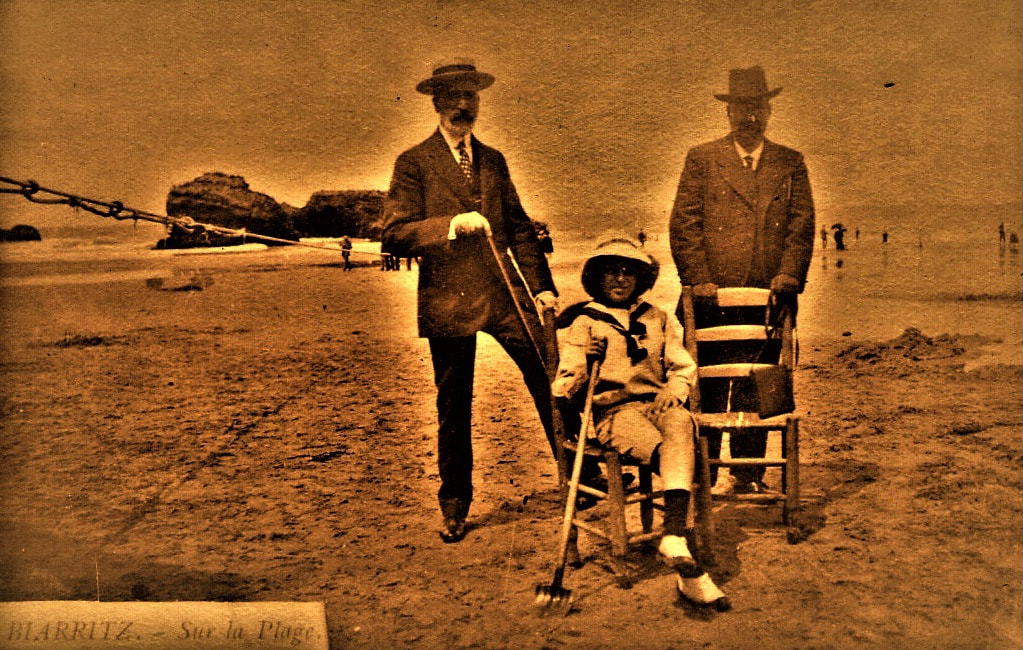
Biarritz, 1914. There they are, enjoying a day at the beach. My great-granddad, elegant in his “canotier”, Spanish diplomat and composer, was appointed Director of the Grand Orchestra of Biarritz a year ago. My granddad, future General of the Spanish Navy, dressed as a sailor, smiles as he sits down. A friend accompanies them.
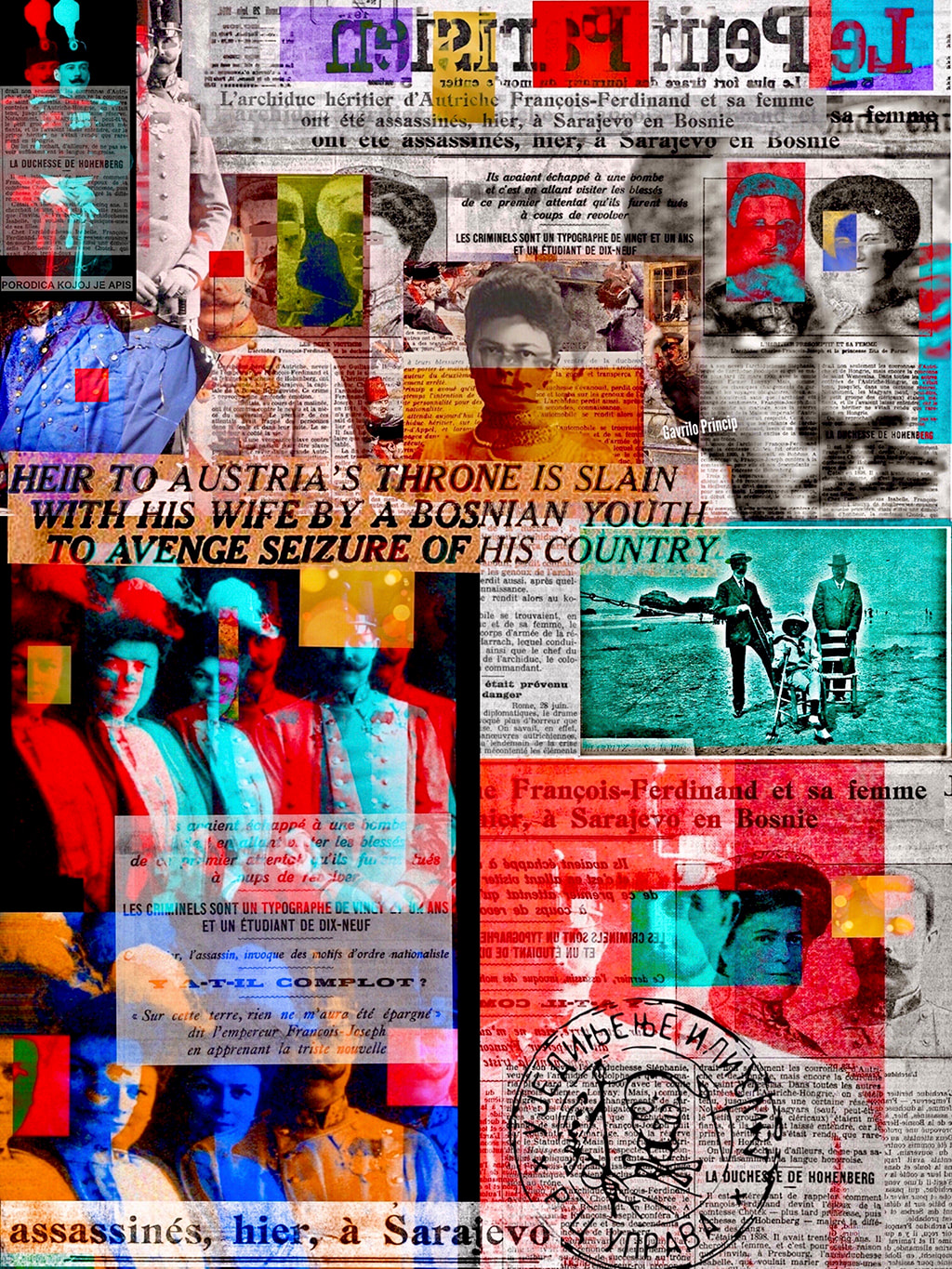
AND ALL THIS FOR A SANDWICH
Stefan Szweig: "Never was Europe stronger, richer and more beautiful. In 1900 - 10 there was more freedom, carefree and carefree than in the previous hundred years".
But Sarajevo came. On a hot day in the summer of 1914, Archduke Franz Ferdinand and his wife visited the city. A sense of humiliation was palpable among the dreamers of Greater Serbia, who wanted to throw off the Austrian yoke. The assassination plot is a disaster. Gavrilo Princip, a member of the Black Hand led by "Apis", coming from the fashionable Moritz Schiller grocery store with a bacon and cheese sandwich, thinking that the attempt had already failed, sees the archdukes' car approaching by surprise and the opportunity to eliminate the hated oppressor of his homeland, throws the sandwich away and shoots. In an instant, a sandwich brings Europe to the brink of the abyss.
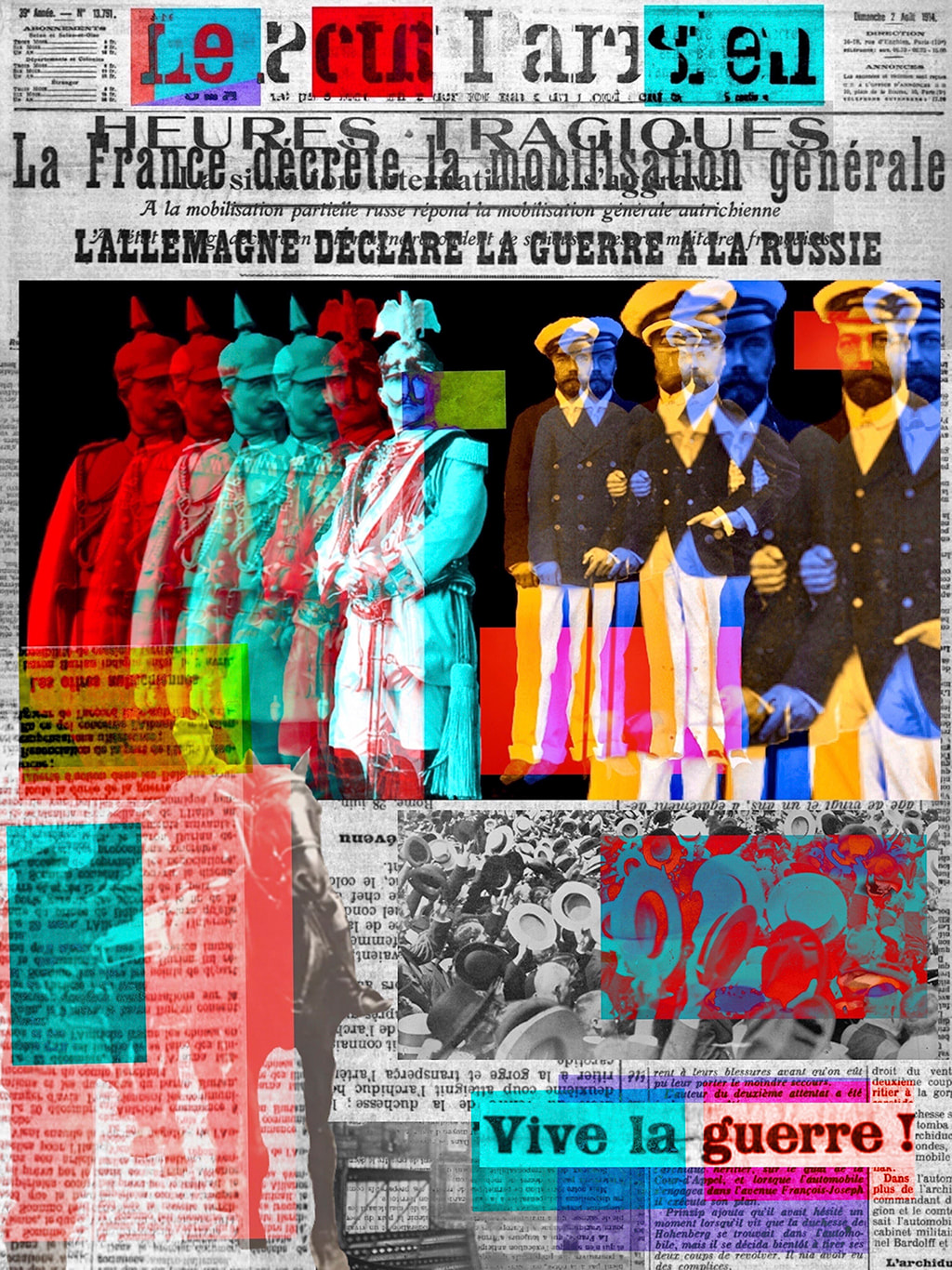
LONG LIVE THE WAR OF THE COUSINS!
I start working with the front pages of various newspapers constructing new images, composing from multiple photographic exposures, superimposing and manipulating texts, from Sarajevo to the declarations of war, the Kaiser Willy and his cousins, the Russian Nicky and the British Georgie, the delirious and unconscious enthusiasm of people shouting "Long live the war!"......... The press, thanks to technological advances, quickly reaches thousands of readers. The telephone transmits news published in national and local newspapers within hours. In 1910, Paris had 70 newspapers. The press was not only informing but also creating public opinion, culture and consumer advertising. But when the declarations of war began a few days later, in August 1914, everything changed in the press as well. As the first battles raged and the death toll rose, the press was to be censored, manipulated and controlled by the governments in an extreme nationalist rivalry.
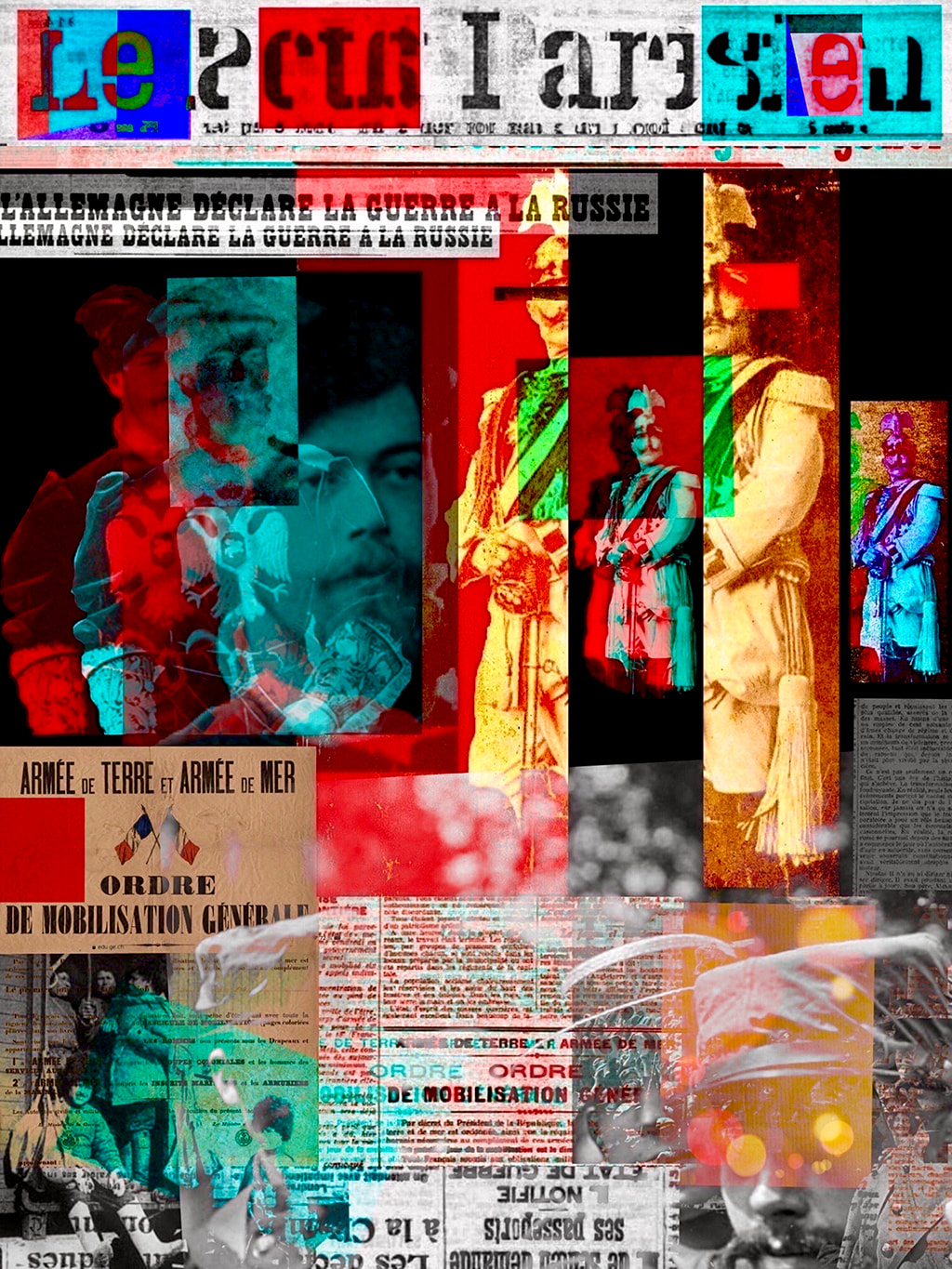
THE MOBILISATION!!!
"Then came August, the ultimatum, the mobilisation and the war, to which everyone rushed joyfully, confident of a sudden victory. The days began to grow shorter and shorter, while the war dragged on longer than expected and nothing was resolved. And everyone was plunged into this atrocious conflict, fuelled by hatred for hatred's sake, propaganda and revanchism, driven to unreason and the trenches, mired in filth both at the front and in the rear."
Emil Haylofts, professor and encyclopaedist.
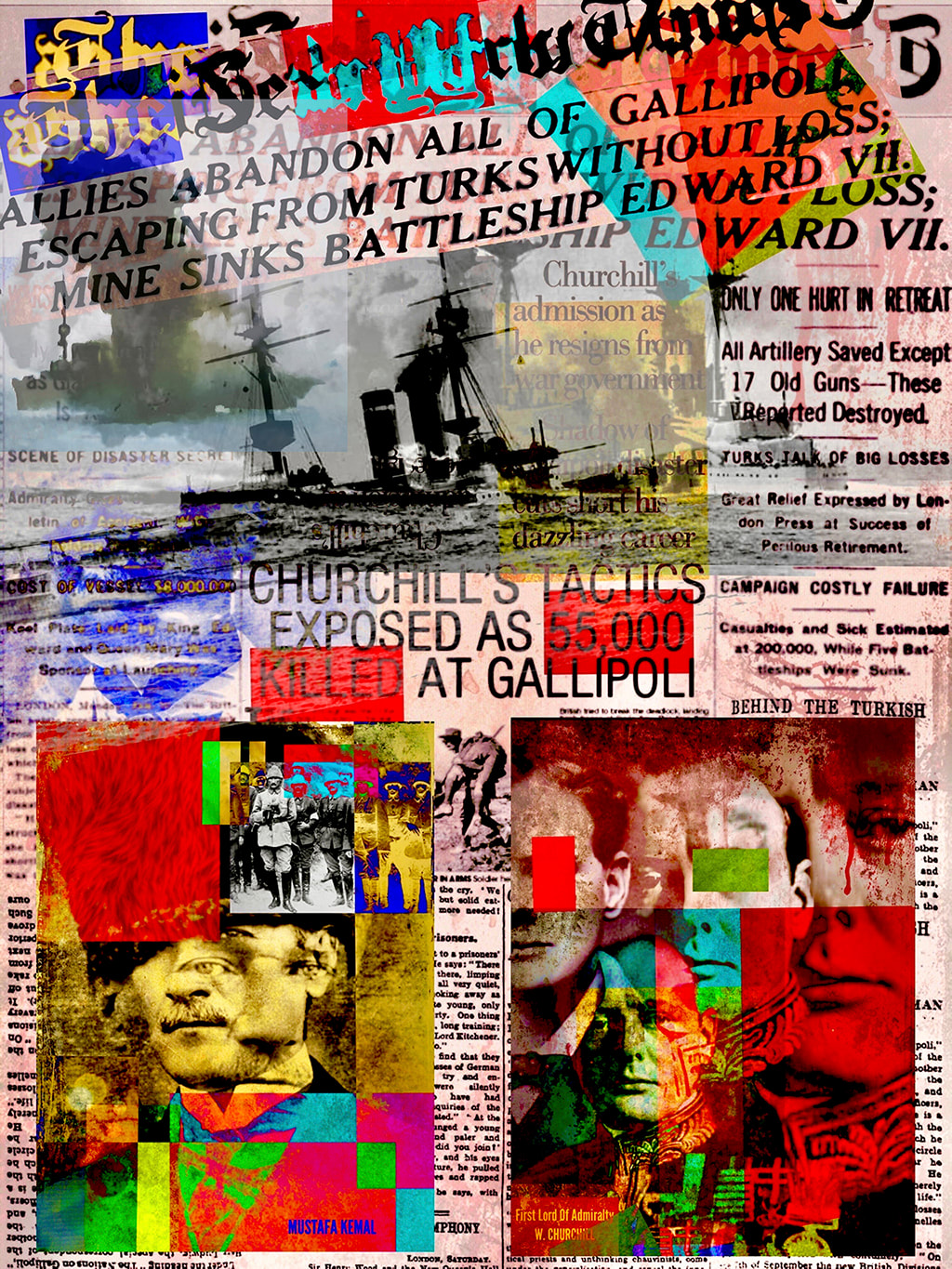
GALLIPOLI
Gallipoli was one of the most shocking battles that provoked the fall from grace, not for long, of “Grand Admiral” Winston Churchill and the outstanding performance of Mustafa Kermal, the future president of Turkey, called Ataturk, who modernised the country with such advanced measures as the vote and political participation of women, divorce, state secularism, the banning of the veil, etc.
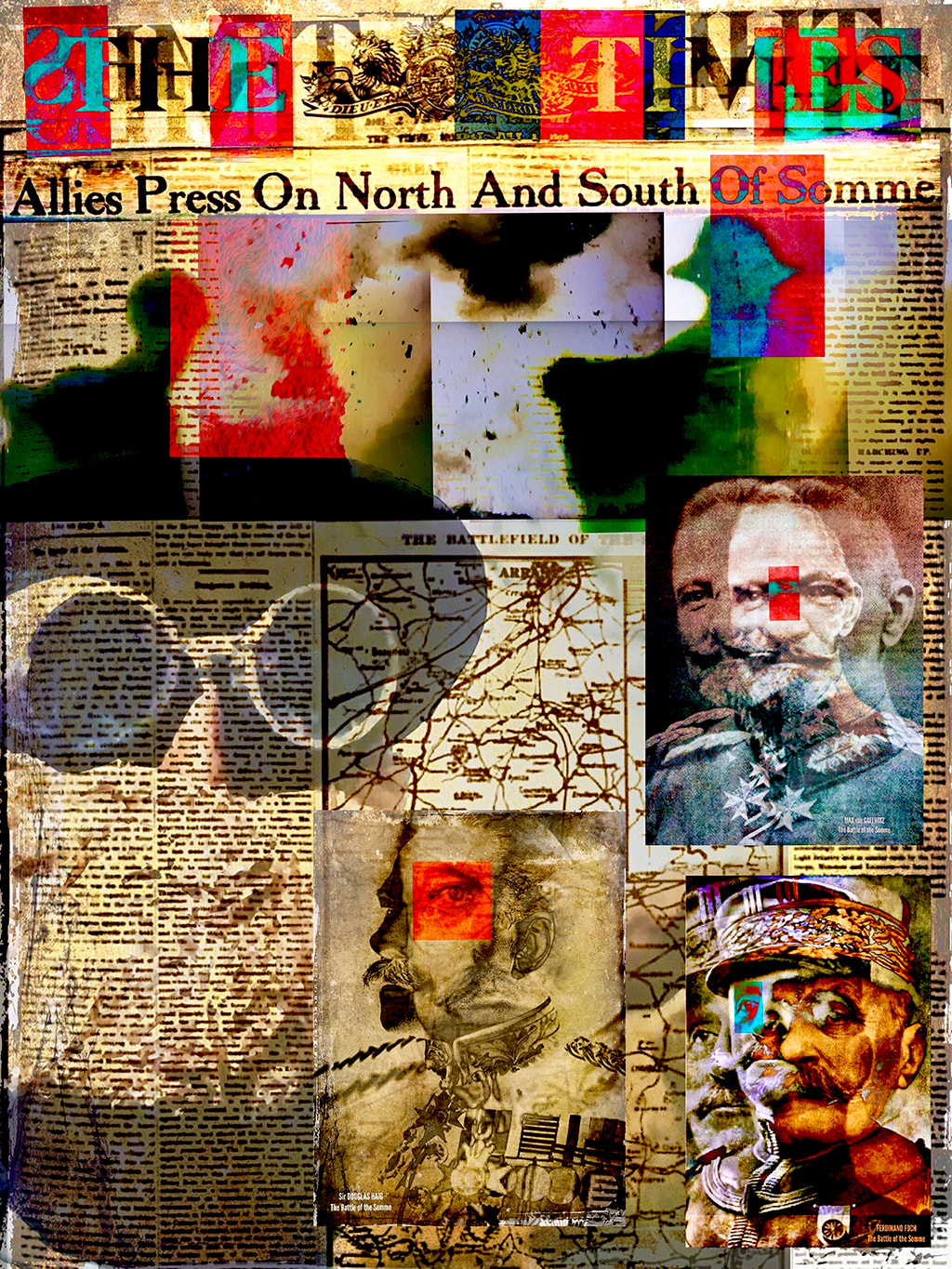
THE HELL OF THE SOMME
More soldiers died on 1 July 1916 than on any other day of the war. It was the most tragic day in the history of the British Army and the most barbaric demonstration of the narrow-mindedness of the politicians and military commanders of the time. In the first six minutes there were almost 20,000 casualties. By the end of the day, 19,240 British soldiers were dead, 2,152 were missing and almost 36,000 were wounded. The Germans suffered between 10,000 and 12,000 casualties. In all, more than a million soldiers were killed, and it was an utterly futile battle that dragged on in the hellish trenches for four interminable months and seventeen days. Generals Douglas Haig, Max von Gallwitz and Ferdinad Foch had the sad honour of being the main protagonists of this barbarism.
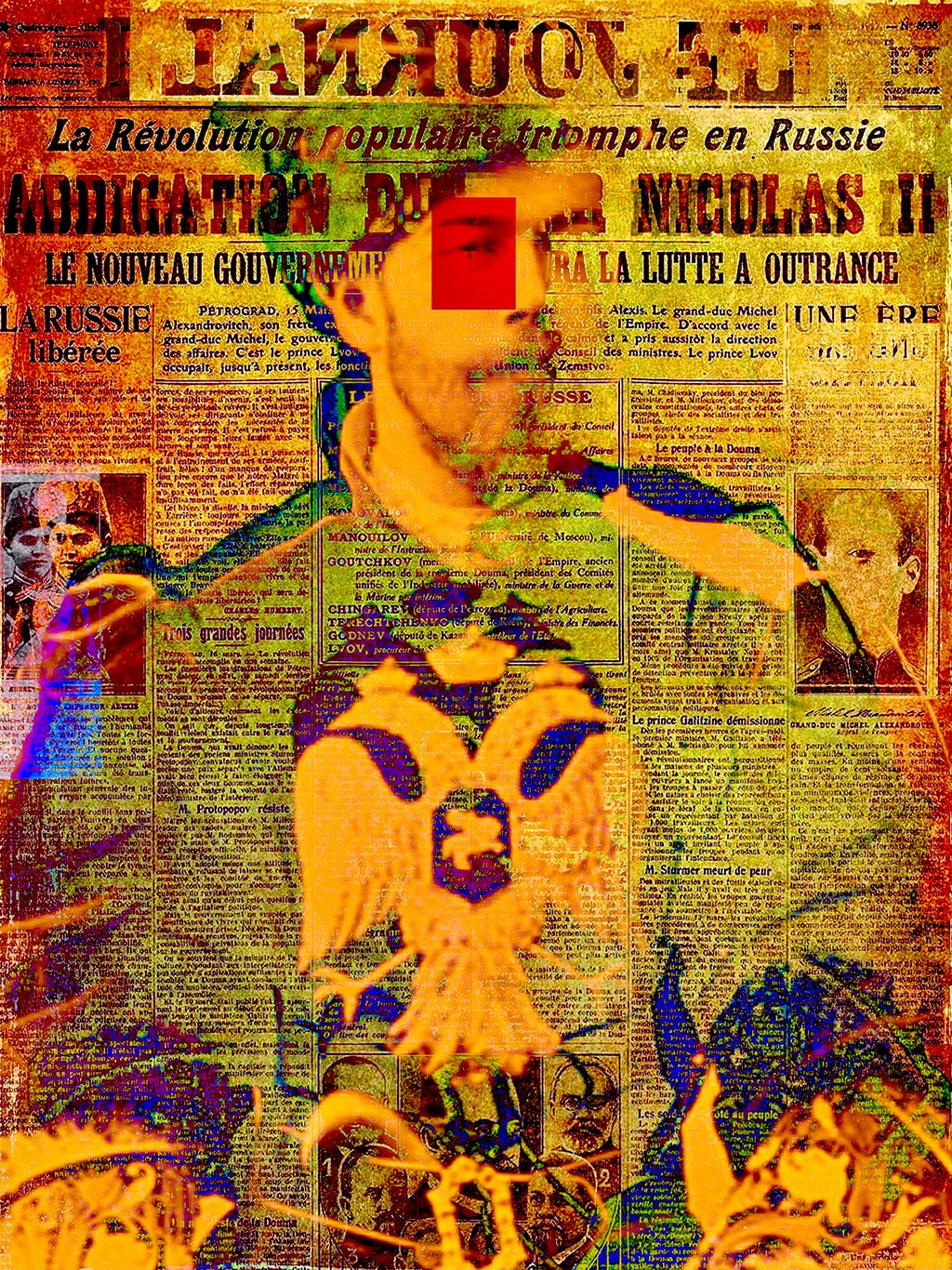
COUSIN NICKY "Ruzski came to see me in the morning and read me his very long conversation by direct cable with Rodzianco. According to it, the situation was such that in Petrograd any minister of the Duma had no power to do anything, since he had to fight against the Social-Democratic Party, represented by the workers' committee. My abdication is demanded. (...) In essence what they are saying is that in order to save Russia and to keep the army at the front calm, this step must be taken. I have accepted. From headquarters they have sent the draft of a proclamation. In the afternoon Guchkov and Shulgin arrived from Petrograd, with whom I discussed the matter and to whom I handed over the signed andcorrected proclamation. At 1 a.m. on the morning of the 16th, I left Pskov with a broken heart because of all that had happened. All around me there is only treachery, cowardice and deceit." Nicholas II. Extract from his diary after his abdication
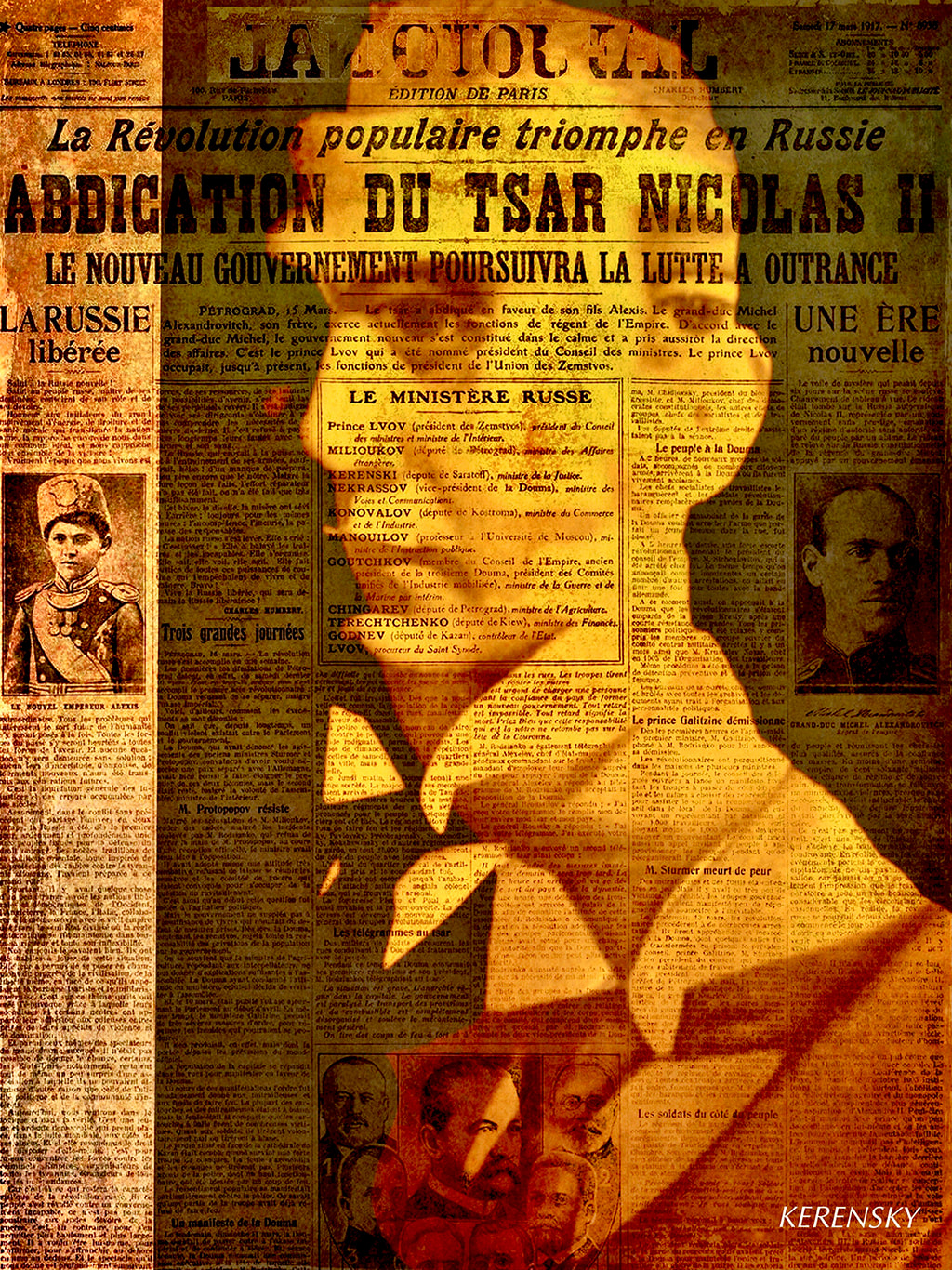
THE WINTER PALACE NURSE
"Yesterday Lenin failed miserably before the Soviet. He was forced to leave the room amid great jeers. He has sunk for ever."
Miliukov, Foreign Minister of the Provisional Government.
July 1917. Kerensky issues an order for Lenin's arrest with the intention of killing or imprisoning him, but Lenin escapes to Finland disguised as a railwayman. In October, all members of the Provisional Government are arrested by the Bolsheviks except Kerensky, who escapes from the Winter Palace in a Red Cross ambulance disguised as a nurse. Shortly afterwards, betrayed by the Cossacks, escapes again from St Petersburg, disguised as a sailor, when he was preparing to recapture the city. He never returned to Russia and died in New York in 1970
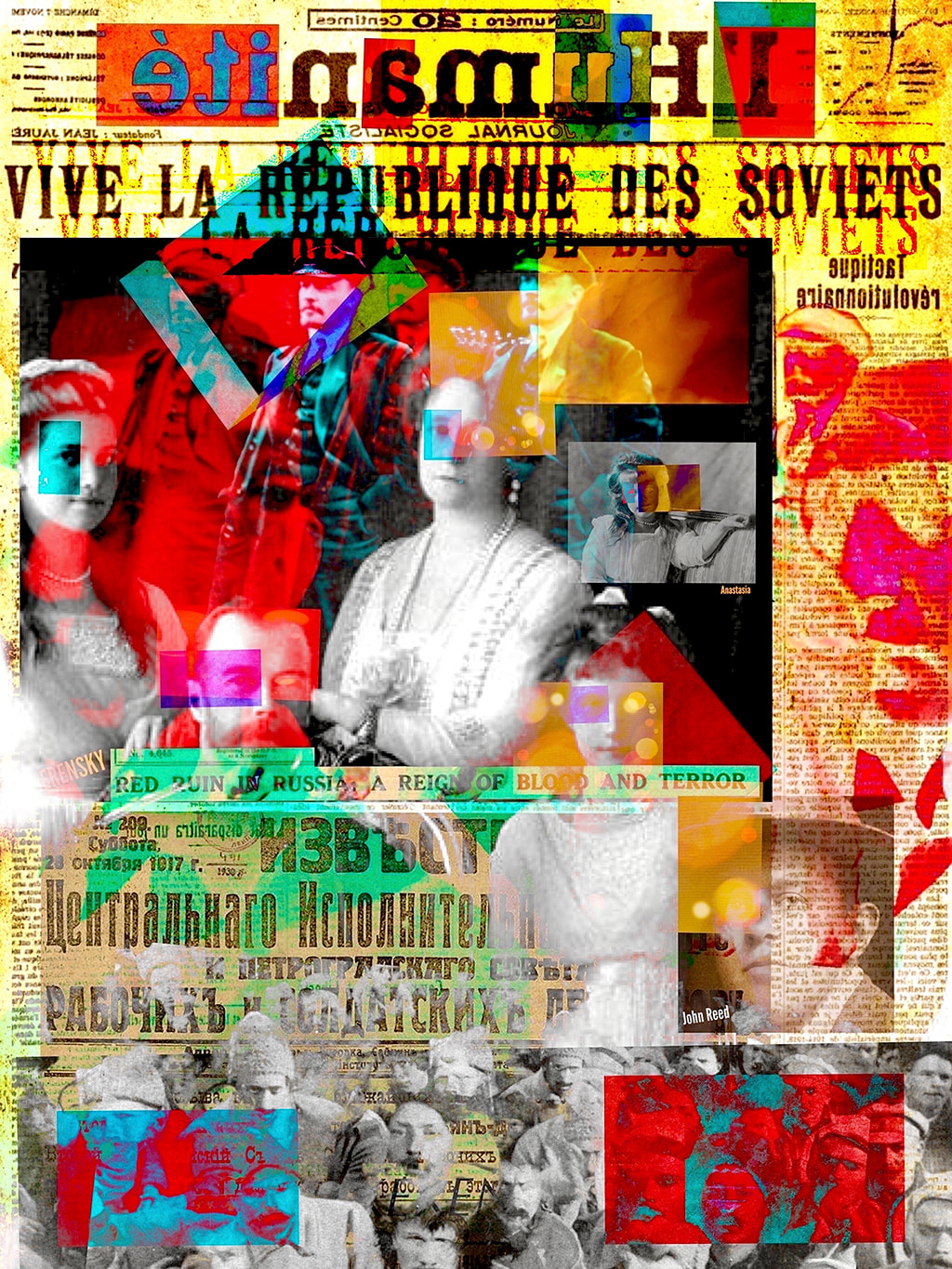
TEN DAYS THAT SHOOK THE WORLD "The Russian revolution is the most powerful event of the World War". Rosa Luxemburg "In the struggle my sympathies were not neutral". John Reed October 1917, the eyes of the world were focused on Europe and the Great War. What was happening in Russia was anecdotal, unnoticed. Reed describes the Revolution on the front line, being one of the few witnesses who was there, committing himself to the cause and turning his account into a journalistic myth. An adventurous and persecuted man in the United States, a founder of the Communist Party in his country, he died of typhus in Moscow in 1920, aged just 33, and is buried among the heroes of the Revolution in the necropolis of the Kremlin Wall. His debut novel was published the year before his death with the preface written by Lenin himself. "All Power to the Soviets". Lenin. Political terror was introduced with the creation of the Cheka in December 1917, the assassination of the Tsar and his family the following year and the creation of the Gulags. The Bolsheviks were suspicious of everyone. Snitching became the norm.
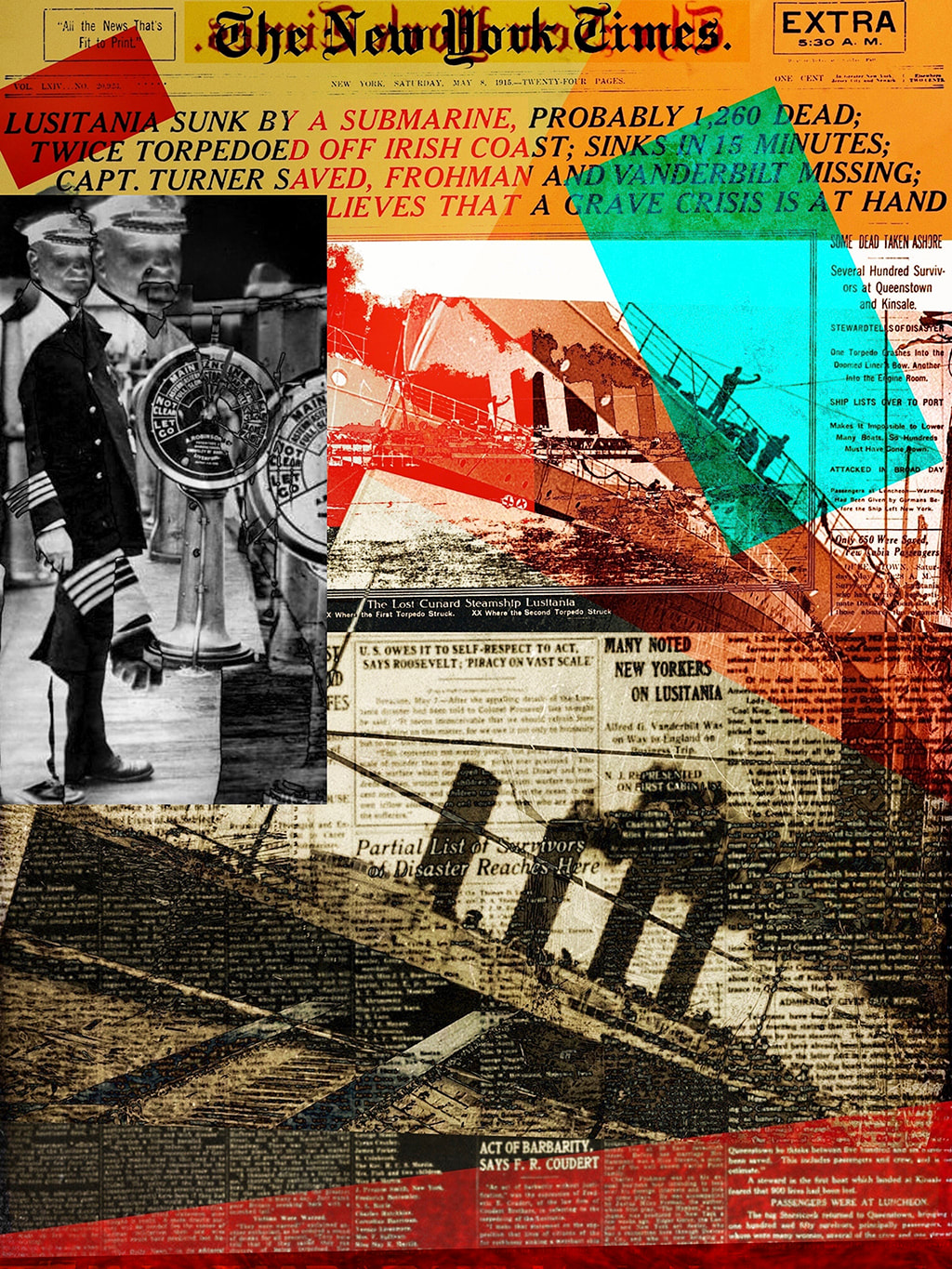
LUSITANIA 14.00 hours on 7 May 1915. "A four-stacker and two masts. Appears to be a passenger ship of large dimensions". Walther Schwieger. Seaman of the German submarine U-20 And Captain Walther C. ordered the last remaining torpedo to be fired. In barely twenty minutes, the Lusitania sank off the Irish coast after leaving New York with its 1,192 occupants, including 94 children and 35 babies. For the first time there was talk of "war crimes". This tragic action sent shockwaves through the United Kingdom and the United States, where most of the passengers were from. "Travellers intending to cross the Atlantic are reminded that a state of war exists between Germany and her allies and Great Britain and her allies and that passengers travelling to the war zone on ships of Great Britain or her allies do so at their own risk." German embassy advertisement in the American press.
Was it yet another tragic war action or a perfect excuse for US intervention in the war?
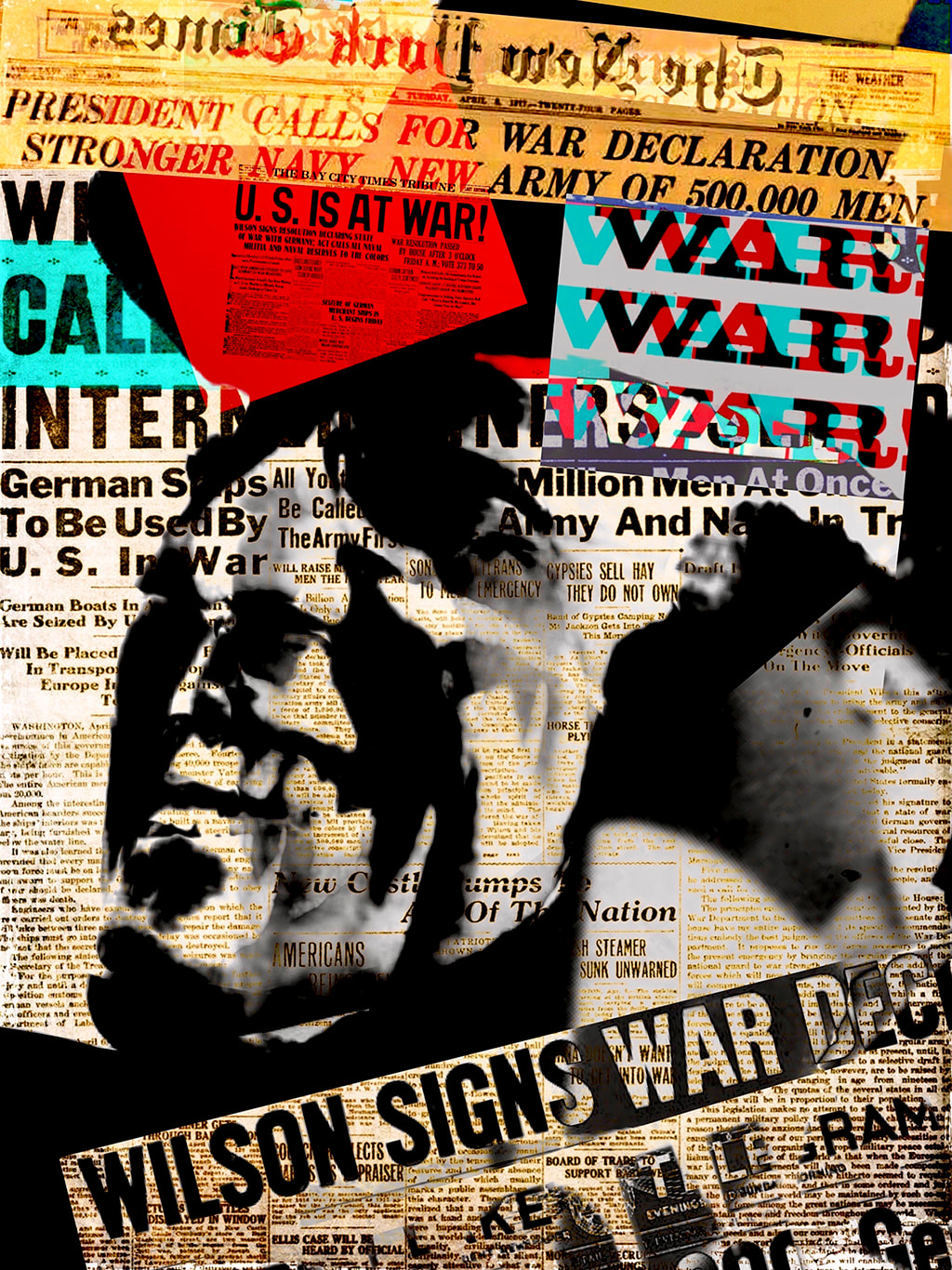
THE AMERICANS
On 14 April 1917 the United States declared war on Germany and Woodrow Wilson created the Committee on Public Information (CPI), a gigantic propaganda organisation to convince Americans of the necessity and nobility of intervention in the war in order to counteract the European press reports of the terrible massacres of millions of soldiers in the trenches. It promoted patriotic pride, soldiers' exploits, sacrifice and hatred of the German enemy with an intensity never seen before. It was led by journalist George Creel, considered a "mukraker", with teams of journalists, writers, publicists, musicians... who organised rallies and parades, wallpapered the country with over 100 million posters, produced films, published magazines and press releases, involving thousands of enthusiastic volunteers while the government encouraged self-censorship and tightly controlled the press. What was to become known as state propaganda began. The Great War became a global war, and from this point onwards the tide turned definitively.
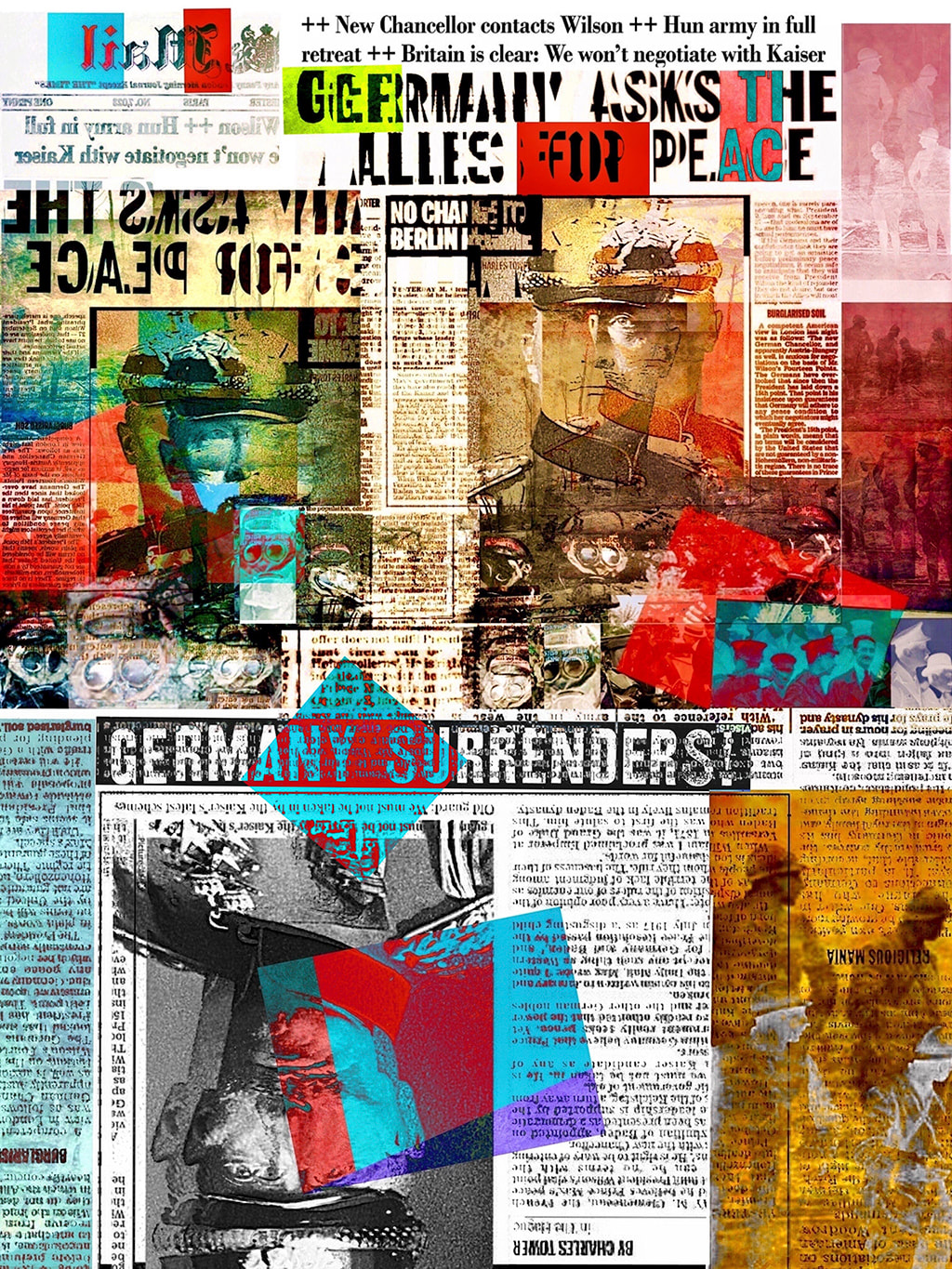
THE LUGGAGE AND THE AUDREY HEPBUR´S GRANDMOTHER
In November 1918 the Kaiser has his headquarters in the Belgian city of Spa while Berlin is in chaos with street protests, socialist demonstrations, food shortages and political movements to push him into abdication and the creation of a republic. The revolution was spreading across the country and Germany was already defeated, the troops refused to fight any longer. On 9 November Hindenburg asked him to abdicate and the Kaiser went into exile in Holland.
"God's hand has fallen heavily upon us, His will be done! On Hindenburg's advice, I leave the army, after terrible mental struggles. As God wills, auf wiedersehen. My eternal gratitude for your faithful love, your deeply mortified husband".
Letter from the Kaiser to his wife
"The old, rotten has collapsed, militarism is eliminated, the Hohenzollerns have abdicated."
Philipp Scheidemann, Social Democratic leader.
In May 1920, the Kaiser marched to a castle in Huis Doom that he bought from Baroness Ella von Heemstra, whose granddaughter became known as Audrey Hepburn. Shortly afterwards, five trains with 59 carriages brought him his "luggage".
Proudly powered by Weebly
